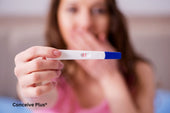I Got Pregnant: What You Need to Know About the Journey

So, I got pregnant. Maybe you planned for this, or maybe it was a total surprise. Either way, the second you see that positive test, everything feels different. A rush of emotions—excitement, nerves, a little bit of “what now?”—is completely normal.
Now what? You might be thinking, "im pregant, so what should I do first?" What to eat, what to avoid, when to see a doctor—it can feel overwhelming. But don’t stress. From early symptoms to prenatal care, this guide will walk you through what to expect. Pregnancy is a journey, and step by step, you’ll figure it out. You got this.
First Signs That You’re Pregnant
The first sign for most women? A missed period. That’s usually when the questions start. But even before that, some women feel different. You might get nausea, your boobs could be sore, or you might be running to the bathroom more than usual. Fatigue? That’s a big one too [1].
Some women also experience light spotting, which is known as implantation bleeding. It happens when the fertilized egg attaches to the uterus. If you’re unsure, the easiest way to know for sure is to take a home pregnancy test. And if it’s positive? Time to call your doctor or midwife to schedule that first prenatal appointment.
One of the most important things to do early on is start taking prenatal vitamins. The baby’s brain and spine start forming in the first few weeks, and folic acid is super important for that. DHA helps with brain and eye development, and iron keeps you from feeling like a total zombie [2].
What to Do If You Find Out Your Pregnant
Okay, so now what? The first thing—breathe. This is happening, and you got this. Step one is to book your first prenatal appointment. The doctor will confirm the pregnancy, calculate your due date, and give you a whole bunch of info about what to expect [3].
The next big thing? Your lifestyle. This is the time to start paying more attention to what you eat, what you drink, and what you do. Cut out alcohol. Smoking? Gotta go. Caffeine? Keep it under 200 mg a day (basically one or two small coffees). Your pregnancy diet plan should be rich in vitamins C, D, and E, plus magnesium, zinc, and iodine. These help balance hormones, keep your energy up, and support the baby’s growth.
Also, think about work, money, and maternity leave. If you work, figure out how much time you’ll get off and start budgeting for all the baby expenses coming your way. Trust me, babies ain’t cheap.
Can I Pregnant Faster? What Helps Conception?
If you’re still trying to get pregnant, you probably wanna know how to speed things up. Timing is everything. Ovulation usually happens about two weeks before your next period. This is when you’re most fertile, so tracking ovulation can help [4]. Some women use temperature charts, ovulation test kits, or check cervical mucus to know when it’s go-time.
Nutrition matters a lot too. Certain pregnancy nutrition can actually boost fertility. Myo-Inositol and D-Chiro Inositol help regulate ovulation, especially for women with irregular cycles. CoQ10 and L-Arginine improve egg quality and boost blood flow to reproductive organs. For men, zinc, selenium, and L-Carnitine can improve sperm count and motility [5].
Exercise helps, but not too much. Stress messes with your hormones, so keeping stress low is key. Also, being underweight or overweight can affect ovulation. So, balance is everything.
Got Her Pregnant – Male Fertility Matters Too
Listen, it takes two to make a baby. If you’re trying to conceive, male fertility is just as important. Sperm health can make a huge difference [6].
Guys, if you’re trying to get your partner pregnant, start paying attention to your diet and lifestyle. Zinc and selenium are crucial for sperm production. L-Carnitine and CoQ10 help sperm swim better and faster. Maca root and ginseng? They can support testosterone and overall reproductive health [7].
Also, cut back on alcohol and smoking, avoid too much heat (like hot tubs or keeping your laptop on your lap for too long), and try to manage stress. Sperm health isn’t something that changes overnight, so the earlier you start, the better.
Eating Right for a Healthy Pregnancy
What you eat now isn’t just for you—it’s for the baby too. Some nutrients are more important than ever.
- Folic Acid helps prevent birth defects.
- Iron keeps your energy up and helps your blood carry oxygen to the baby.
- Calcium and Vitamin D are important for strong bones and teeth.
- Omega-3s (DHA) help with brain and eye development.
- Vitamin B6 and Magnesium can help with nausea and keep muscles from cramping.
Try to eat a mix of lean proteins, whole grains, healthy fats, fruits, and veggies. And drink water. Lots of it. Dehydration during pregnancy is no joke.
Dealing with Pregnancy Symptoms
Every pregnancy is different, but some symptoms hit almost everyone. Morning sickness is a big one. It’s called “morning” sickness, but let’s be real—it can hit anytime. Small, frequent meals help, and ginger can be a lifesaver [8].
Fatigue is real too. Growing a human is exhausting. Make sure you’re getting enough iron, magnesium, and B vitamins to help with energy levels.
Digestion can slow down, leading to bloating and constipation. Drinking plenty of water and eating fiber-rich foods can help. Calcium and magnesium also help relax muscles and prevent leg cramps, which can get worse as the pregnancy progresses [9].
By the third trimester, your body might start feeling heavy. Swelling, back pain, and trouble sleeping are super common. Light exercise like prenatal yoga or walking can help. A pregnancy pillow is also a game changer.
Getting Ready for Labor and Delivery
As the due date gets closer, it’s time to start preparing for labor. Talking to your doctor or midwife about your birth plan can help you feel more in control. Whether you want a hospital birth, a home birth, or something in between, knowing your options is important.
Packing a hospital bag early is smart. Pack comfy clothes, toiletries, baby clothes, snacks, and anything that makes you feel relaxed. Labor can be unpredictable, so flexibility is key [10].
Also, make sure your support team is ready. Whether it’s your partner, family, or a doula, having people around who can help makes a big difference.
The Bottom Line
Pregnancy is wild. It’s exciting, exhausting, overwhelming, and amazing all at the same time. If you’ve just found out "I got pregnant", it’s totally normal to feel all kinds of emotions. Take it one day at a time, take care of yourself, and trust that your body knows what it’s doing.
There’s no perfect way to do this. Every pregnancy is different. But staying informed, eating well, getting the right prenatal care, and listening to your body will set you up for a healthy pregnancy and a smooth delivery. You got this!
FAQs
Can I Pregnant If I Have Irregular Cycles?
Yes, but it might take longer. Supplements like Myo-Inositol and D-Chiro Inositol can help regulate cycles and improve ovulation.
What Foods Should I Eat During Pregnancy?
Focus on foods rich in folic acid, iron, omega-3s, and vitamin D. Avoid raw seafood, processed foods, and excessive caffeine.
When Should I Start Prenatal Vitamins?
Start taking them at least three months before trying to conceive. Look for folic acid, DHA, and iron in your prenatal vitamin.
How Soon Can I Find Out If I’m Pregnant?
A home pregnancy test can detect pregnancy about 10-14 days after ovulation. Blood tests can confirm even earlier.
What to Do If You Find Out Your Pregnant Unexpectedly?
Take a deep breath. Schedule a doctor’s appointment, start taking care of yourself, and give yourself time to process everything.
Citations
- Mayo Clinic. (2023). Symptoms of pregnancy: What happens first. Available at: https://www.mayoclinic.org/healthy-lifestyle/getting-pregnant/in-depth/symptoms-of-pregnancy/art-20043853#:~:text=Light%20spotting%20might%20be%20one,to%20have%20a%20menstrual%20period.
- Jiang, Y., Chen, Y., Wei, L., Zhang, H., Zhang, J., Zhou, X., Zhu, S., Du, Y., Su, R., Fang, C., Ding, W., & Feng, L. (2023). DHA supplementation and pregnancy complications. Journal of translational medicine. Available at: https://pubmed.ncbi.nlm.nih.gov/37330569/
- Farrell, R. M., Pierce, M., Collart, C., Edmonds, B. T., Chien, E., Coleridge, M., Rose, S. L., Perni, U., & Frankel, R. (2020). Making the most of the first prenatal visit: The challenge of expanding prenatal genetic testing options and limited clinical encounter time. Prenatal diagnosis. Available at: https://pmc.ncbi.nlm.nih.gov/articles/PMC10114520/
- Practice Committee of the American Society for Reproductive Medicine and the Practice Committee of the Society for Reproductive Endocrinology and Infertility. Electronic address: asrm@asrm.org (2022). Optimizing natural fertility: a committee opinion. Fertility and sterility. Available at: https://pubmed.ncbi.nlm.nih.gov/34815068/
- Salas-Huetos, A., Bulló, M., & Salas-Salvadó, J. (2017). Dietary patterns, foods and nutrients in male fertility parameters and fecundability: a systematic review of observational studies. Human reproduction update. Available at: https://pubmed.ncbi.nlm.nih.gov/28333357/
- Sharma, R., Biedenharn, K. R., Fedor, J. M., & Agarwal, A. (2013). Lifestyle factors and reproductive health: taking control of your fertility. Reproductive biology and endocrinology: RB&E. Available at: https://pubmed.ncbi.nlm.nih.gov/23870423/
- Gonzales G. F. (2012). Ethnobiology and Ethnopharmacology of Lepidium meyenii (Maca), a Plant from the Peruvian Highlands. Evidence-based complementary and alternative medicine. Available at: https://pubmed.ncbi.nlm.nih.gov/21977053/
- Einarson, A., Maltepe, C., Boskovic, R., & Koren, G. (2007). Treatment of nausea and vomiting in pregnancy: an updated algorithm. Canadian family physician Medecin de famille canadien. Available at: https://pmc.ncbi.nlm.nih.gov/articles/PMC2231543/
- Institute of Medicine (US) Committee on Nutritional Status During Pregnancy and Lactation. Nutrition During Pregnancy: Part I Weight Gain: Part II Nutrient Supplements. Available at: https://www.ncbi.nlm.nih.gov/books/NBK235246/
- Mayo Clinic. (2023). Your Mayo Clinic packing checklist. Available at: https://www.mayoclinic.org/patient-visitor-guide/your-packing-checklist
Buy prenatal vitamins with DHA from Conceive Plus, the fertility brand formulated for positive results! Helping trying to conceive and pregnant women with the best prenatal with DHA for pregnancy, the premium prenatal with DHA supplements available with free shipping. Order prenatal vitamins with DHA online here.



















